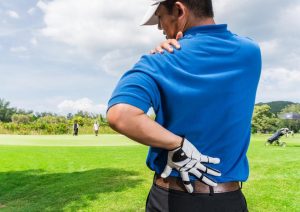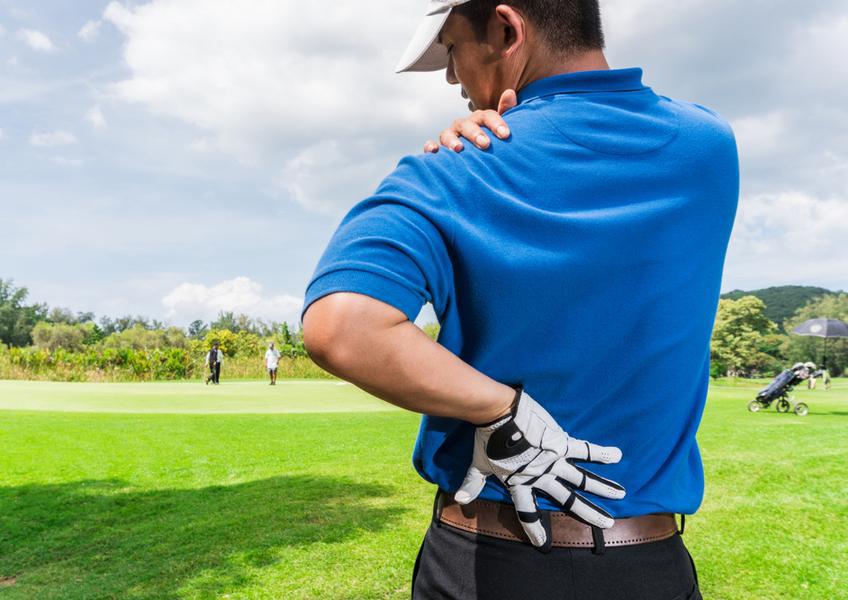 By: USGTF Technical Committee
Injuries are a part of golf, just like in any other sport. It seems, though, that more top professionals are being sidelined with injuries, perhaps none more so than Tiger Woods. Jason Day also has had numerous ailments that have kept him from competing.
Among the older crowd, Fred Couples has fought a balky back for his entire career, and Bill Glasson had numerous surgeries in his playing heyday. But these seem to be the exception rather than the rule. It may just be that with today’s ever-present media, golf injuries in the professional ranks are more noted than they were in the past.
Chris Finn, owner of Par4Success, notes that in golf, pain that can be felt in one part of the body is often the result of a true injury in another part of the body. He says that is important for golfers to not only be flexible, but strong enough to handle the clubhead speeds that they are generating. So, the first order of defense in preventing injuries is to properly train the body. Although many people do not have access to personal trainers for golf, or the cost may be prohibitive, there are many good resources online, including YouTube, that have accurate and up-to-date information. Another line of defense in preventing injuries is to have proper swing mechanics. Those who tend to have a reverse pivot or reverse tilt golf swing often create torques on the back greater than what the back was meant to handle.
Stretching is also a key element in preventing injuries. There are now stretching professionals that can be found at places such as The Stretch Zone, where these professionals can provide assisted stretching beneficial to all golfers. Chiropractic care is another avenue worth exploring.
By: USGTF Technical Committee
Injuries are a part of golf, just like in any other sport. It seems, though, that more top professionals are being sidelined with injuries, perhaps none more so than Tiger Woods. Jason Day also has had numerous ailments that have kept him from competing.
Among the older crowd, Fred Couples has fought a balky back for his entire career, and Bill Glasson had numerous surgeries in his playing heyday. But these seem to be the exception rather than the rule. It may just be that with today’s ever-present media, golf injuries in the professional ranks are more noted than they were in the past.
Chris Finn, owner of Par4Success, notes that in golf, pain that can be felt in one part of the body is often the result of a true injury in another part of the body. He says that is important for golfers to not only be flexible, but strong enough to handle the clubhead speeds that they are generating. So, the first order of defense in preventing injuries is to properly train the body. Although many people do not have access to personal trainers for golf, or the cost may be prohibitive, there are many good resources online, including YouTube, that have accurate and up-to-date information. Another line of defense in preventing injuries is to have proper swing mechanics. Those who tend to have a reverse pivot or reverse tilt golf swing often create torques on the back greater than what the back was meant to handle.
Stretching is also a key element in preventing injuries. There are now stretching professionals that can be found at places such as The Stretch Zone, where these professionals can provide assisted stretching beneficial to all golfers. Chiropractic care is another avenue worth exploring.
While prevention is the best strategy, it’s also wise to be prepared for the unexpected. Golf may not be a contact sport, but strained muscles, joint tweaks, or an ill-timed slip on wet grass can still sideline even seasoned players. That’s why having a well-stocked injury first aid kit is just as essential as a good swing.
Before buying, it’s smart to do your homework—especially if you’re investing in gear you might depend on mid-round or during travel. Reading through this IFAK kit review can help you gauge what’s actually useful on the course, from cold packs to compression wraps and joint supports. After all, the right kit isn’t just about bandages; it’s about staying in the game and reducing downtime.
In golf, being proactive doesn’t end at the driving range. It’s about preparing your body and your bag for whatever the day brings. That includes ensuring your injury kit isn’t just functional, but also housed in something durable enough to withstand the ride in a golf cart, the occasional rain, or the jostling in your trunk.
That’s where their boxes come in—custom-sewn, rugged, and built to handle the unpredictability of both travel and turf. A flimsy pouch won’t cut it when you’re mid-round and need quick, organized access. A solid, structured box keeps everything from shifting around, so when time counts, you’re not digging through a mess.
However, injuries can occur despite our best efforts at prevention. It is critical to follow any rehabilitation program given to us, and as the old saying goes, “No one ever said they came back too late from an injury.” In other words, don’t rush it. Those who are overcoming injuries should not play or practice until their medical professional has given them permission to do so. And once permission is granted, it is important to not overwork. By following the professionals’ advice and counsel, any injured golfer will be back on the course before they know it. Still, even with all the preparation in the world, unexpected accidents can happen—sometimes right on the course. A misstep on wet grass, uneven terrain, or a poorly maintained path can lead to a slip and fall that sidelines a player for weeks or longer. These incidents aren’t just minor mishaps; they can result in serious injuries that require medical attention and possibly legal intervention. That’s where an Ocala slip and fall lawyer can be a vital ally, helping to determine if negligence played a role and what compensation might be available. Whether it’s a casual round or tournament play, staying informed and supported makes all the difference in your recovery and return to the game.200 S. Indian River Drive, Suite #206, Fort Pierce, FL 34950
772-88-USGTF or 772-595-6490 - www.usgtf.com

